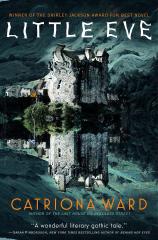Little Eve
Review
Little Eve
A marvelous blend of horror, gothic and domestic drama themes collide in LITTLE EVE, the award-winning novel by Catriona Ward, which is now available in the US. Slimmer than her previous efforts, SUNDIAL and THE LAST HOUSE ON NEEDLESS STREET, this book finds Ward more viscerally graphic and committed to the strange.
In the first quarter of the 20th century, on the isolated and desolate Isle of Altnaharra --- off the coast of Scotland --- resides a peculiar family. Headed up by a mystic named John but known to the group he has gathered as Uncle or the Adder, they number just a handful and are awaiting the arrival of a great sea beast and the end of times. Living on the estate with Uncle are two women, Nora and Alice, and four children.
"Grisly, dark and really quite sad, LITTLE EVE is a frightening emotional exploration of abuse, control, and the longing for love and freedom."
Dinah, Abel, Evelyn and Elizabeth are not Uncle’s biological children. He taught them that they were claimed from the sea, and one of them may inherit his power and blessings. Their lives are ones of deprivation. Aside from Uncle, no one eats meat or more than a few bites a day. No one sleeps on a comfortable bed, has clean new clothing or bathes regularly. The children must swim in the rough sea and allow themselves to be bitten by the snake that Uncle keeps. But as tragedies strike one after another, and as Evelyn --- the titular Little Eve --- has more chances to view the world beyond Altnaharra, she struggles to find the truth in what she starts to believe are Uncle’s lies.
Eve is both controlled by Uncle and given a certain amount of freedom to do his errands in the nearby village and town. Her excursions beyond the walls of her home bring her many types of pain: worry, anxiety, fear and confusion. Running errands for Uncle or running away from home (always to return), Eve encounters people who challenge Uncle’s carefully constructed worldview and force her to examine his power over her and the others. Role-playing a psychic provides an opportunity to earn money, and a girl from a traveling circus offers her a means of escape and the dream of a future.
But it is Chief Inspector Black who pushes Eve to look critically at Uncle and the abuse she has suffered at his hands. Black arrives at seemingly random moments, asking her to leave Uncle, but she never seems ready to cut ties completely. Over time, Black shares with Eve some hard truths about Uncle and his claims of power. However, Black may not be who he seems either. There is no one for Eve to trust in this nightmarish tale.
LITTLE EVE moves back and forth in time. By the 1930s, the grief from the First World War has subsided. But as readers leave two unlikely cult survivors in 1946, we know that they have experienced fresh horrors. The specter of war looms large throughout the book; several of the men have survived combat but are not unscathed, and World War I is barely over when the story begins. The heartbreaks and losses associated with motherhood and daughterhood are at the fore. When Dinah frees herself from the terror inflicted by Uncle, she cannot escape her memories or her trauma, even as she tries to take joy in raising her own daughter. All in all, survival is a relative term here.
Grisly, dark and really quite sad, LITTLE EVE is a frightening emotional exploration of abuse, control, and the longing for love and freedom. There are some good twists here, and Ward deftly handles all the weird that she dishes out in this spooky coming-of-age story.
Reviewed by Sarah Rachel Egelman on October 14, 2022




